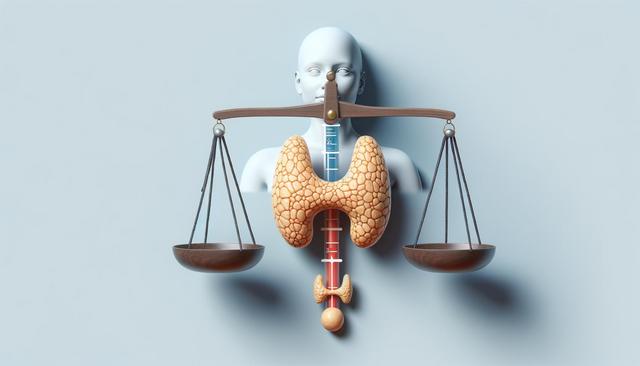Recognizing the Key Symptoms of Thyroid Imbalance in Women Over 40
As women age, hormonal changes can bring various health challenges, and the thyroid gland plays a crucial role in this process. One of the most important aspects to monitor is the key symptoms of thyroid imbalance in women over 40. These symptoms can be subtle at first but may intensify over time if left unaddressed. Common signs include unexplained weight fluctuations, persistent fatigue, sensitivity to cold, dry skin, and thinning hair. Mental health changes, such as depression or anxiety, can also signal that something isn’t functioning properly with the thyroid.
In addition, menstrual irregularities or heavier-than-usual periods may be linked to thyroid dysfunction. Women in this age group should be particularly attentive to these changes, as they often overlap with perimenopausal symptoms, making diagnosis more complex. A proactive approach to recognizing these signals is essential to managing thyroid health effectively.
The Link Between Weight Changes and Fatigue Related to Thyroid Function
One of the more noticeable indicators of a thyroid issue is a change in weight without a clear cause. The thyroid regulates metabolism, so when it becomes underactive (hypothyroidism), it slows down the body’s ability to burn calories, leading to weight gain. Conversely, an overactive thyroid (hyperthyroidism) can increase metabolism, sometimes causing unexpected weight loss.
Alongside weight shifts, fatigue is a prevalent complaint. This type of tiredness doesn’t often improve with rest and can interfere with daily activities. These symptoms are often interrelated and may be early signs of a thyroid imbalance. Monitoring energy levels and weight trends over time can help determine whether a medical evaluation is necessary.
- Unexplained weight gain or loss
- Persistent tiredness despite adequate sleep
- Feeling sluggish or slow in movement and thought
Addressing weight changes and fatigue related to thyroid function early can prevent more severe complications and support overall well-being.
Mood Changes: When Mood Swings Could Be Hormone Related
Hormonal fluctuations, especially involving the thyroid, can have a significant impact on mental health. Many people are surprised to learn that mood swings and emotional instability can be directly tied to thyroid function. When mood swings could be hormone related, it’s often due to changes in thyroid hormone levels that affect neurotransmitters in the brain, such as serotonin and dopamine.
Women experiencing increased irritability, anxiety, or low mood—especially if these emotions are new or have worsened—should consider whether their thyroid might be contributing. These psychological symptoms can sometimes be mistaken for stress or aging, delaying proper diagnosis. Consulting a healthcare provider about these concerns is a step toward identifying the root cause.
- Sudden or unexplained mood changes
- Increased feelings of anxiety or depression
- Difficulty concentrating or memory issues
Understanding the hormonal connection to mood can help individuals seek the right kind of support and treatment.
Natural Ways to Support Thyroid Health
While medical treatment is sometimes necessary, there are also natural ways to support thyroid health that can complement traditional approaches. Lifestyle and dietary changes can make a meaningful difference in promoting hormonal balance. Reducing stress through practices like yoga, meditation, or regular physical activity can positively influence thyroid function.
In terms of diet, focusing on foods that improve thyroid function is a powerful strategy. Nutrient-rich options that support thyroid health include:
- Seafood such as salmon or sardines (rich in omega-3s and iodine)
- Leafy greens and cruciferous vegetables in moderation
- Nuts and seeds, especially those high in selenium like Brazil nuts
- Whole grains and legumes for sustained energy
Staying hydrated, limiting processed foods, and maintaining a balanced intake of macronutrients also contribute to optimal thyroid performance. These natural interventions may not replace medical care but can enhance the body’s ability to regulate thyroid hormones more effectively.
Knowing When to Test for TSH and Thyroid Antibodies
Understanding when to test for TSH and thyroid antibodies is a key part of managing thyroid health. The TSH (thyroid-stimulating hormone) test is a primary tool for evaluating thyroid function. However, in cases where autoimmune conditions such as Hashimoto’s thyroiditis or Graves’ disease are suspected, testing for thyroid antibodies becomes essential.
Regular screening is especially important for women over 40, even in the absence of obvious symptoms. Those with a family history of thyroid disorders, or who are experiencing multiple symptoms like fatigue, weight changes, or mood disturbances, should discuss testing options with their healthcare provider. Early detection allows for more effective management and can prevent complications such as cardiovascular issues or metabolic disturbances.
- Routine TSH testing during annual checkups
- Antibody testing if autoimmune thyroid disease is suspected
- Monitoring hormone levels during perimenopause and menopause
Proactive testing ensures that any imbalance is identified and addressed promptly, supporting better health outcomes over time.
Conclusion: Taking Charge of Your Thyroid Health
For women over 40, staying informed about thyroid health can lead to better overall wellness. Recognizing the key symptoms of thyroid imbalance in women over 40, understanding the connection between weight changes and fatigue related to thyroid function, and knowing when mood swings could be hormone related can all guide timely and effective intervention. By exploring natural ways to support thyroid health and paying attention to foods that improve thyroid function, individuals can take actionable steps toward hormonal balance. Lastly, being aware of when to test for TSH and thyroid antibodies empowers women to catch potential issues early. With the right knowledge and support, managing thyroid health becomes a proactive journey rather than a reactive one.




Leave a Reply